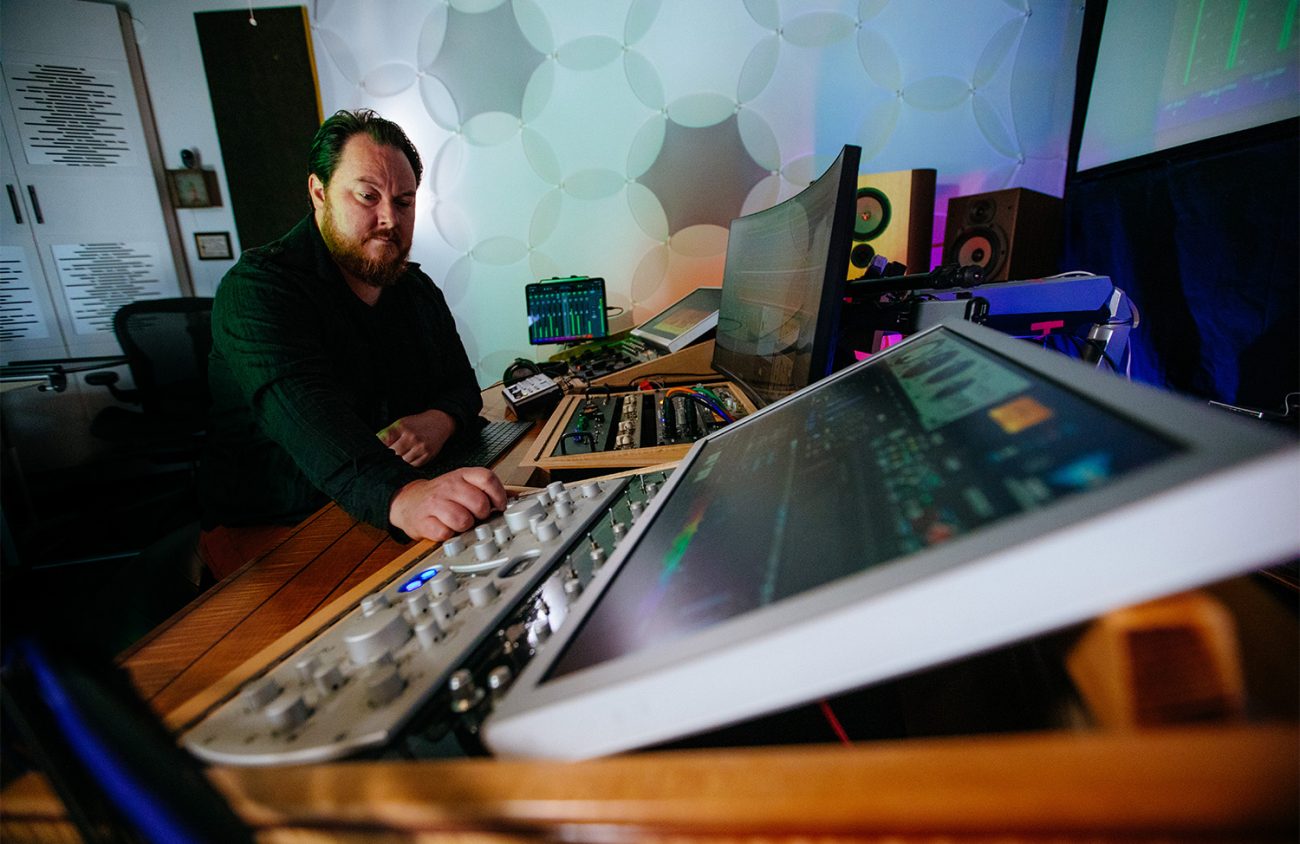Thaddeus Moore remembers sitting in a movie theater in 2008, watching Forgetting Sarah Marshall and hearing Frank Black’s “You Can’t Break a Heart and Have It” start playing. It was one of many songs that Black recorded at Sprout City, so hearing it in a movie featuring big names like Russell Brand and Jason Segel was a surreal moment for Moore.
“I was like, ‘Wait a minute, Oh my God! This song in a huge movie was recorded in my little studio,’” Moore tells me.
While he was living in Eugene, Black, a founding member of the legendary alt-rock band Pixies (who also performs under the name of Black Francis and is also known by his real name of Charles Thompson), discovered Eugene’s Sprout City Studios after seeing its name and phone number on a bumper sticker, Moore says.
According to Moore, Black was fascinated that a recording studio had a bumper sticker and that someone would be so enamored with it that they would put a sticker on their car.
Black went on to record several songs for critically acclaimed solo albums at the studio. He even wrote riffs on the spot in the studio whenever he was on time crunch from his label, Moore says.
Black is just one of many musicians who’s recorded at Sprout City Studios — a list that includes local musicians such as The Shifts, Endr Won, Sojourner and Tyler Fortier.
The small yet cozy space in Eugene has been an affordable option for local musicians to record and rehearse. It’s also been an inviting place for studio engineers to learn the ropes of running a recording studio. Earlier this year, Moore announced that he was planning to sell the studio — but only to the right person who wants to keep what Moore describes as the studio’s co-op model. Moore will be moving full time to mastering instead of recording music. But Sprout City will remain a place for the local scene.
“I’m just feeling lucky that this place is about to turn 24,” Moore says.
Getting in Tune
It was 1996 and Moore was hitchhiking in New Zealand, learning about permaculture by visiting different sites. He was traveling with a doctor from Australia who had just been divorced and was in New Zealand on vacation. “After spending a couple days together, he was like, ‘You should go into the music business. All you ever do is talk about music,’” Moore says. The seed that became Sprout City Studios was planted.
In 1997, Moore returned to Eugene and took some audio engineering and business courses at Lane Community College. Then his best friend at the time made the suggestion to establish a studio where it could also be a rehearsal space. “We were getting the cops called on us at the house we lived at,” Moore says.
They found an old bean sprout growing factory. When they moved into the building, Moore stepped into the room where the walk-in refrigerator was because they wanted to put an isolated vocal booth there. But he says he smelled mold right away, so they decided to rebuild the room. But much to the delight of the former owners, they kept the name: Sprout City.
The studio is located on the corner of 11th and Chambers, but once inside the recording room, the sounds of traffic are silenced. Like he did when improving other parts of the studio, Moore says he checked out books on DIY projects from the library. The recording studio room doesn’t have shared walls with the rest of the building — he built it so there’s 16 inches of space between walls — so it’s basically a floating room, he adds
“This is a dead ass room for how close we are to the road,” he says. “That’s the hallmark of a good space.”
He was 19, and new to starting a business like a recording studio. “I was working two jobs, trying to pay my bills, but it’s got low overhead for where it is,” he says.
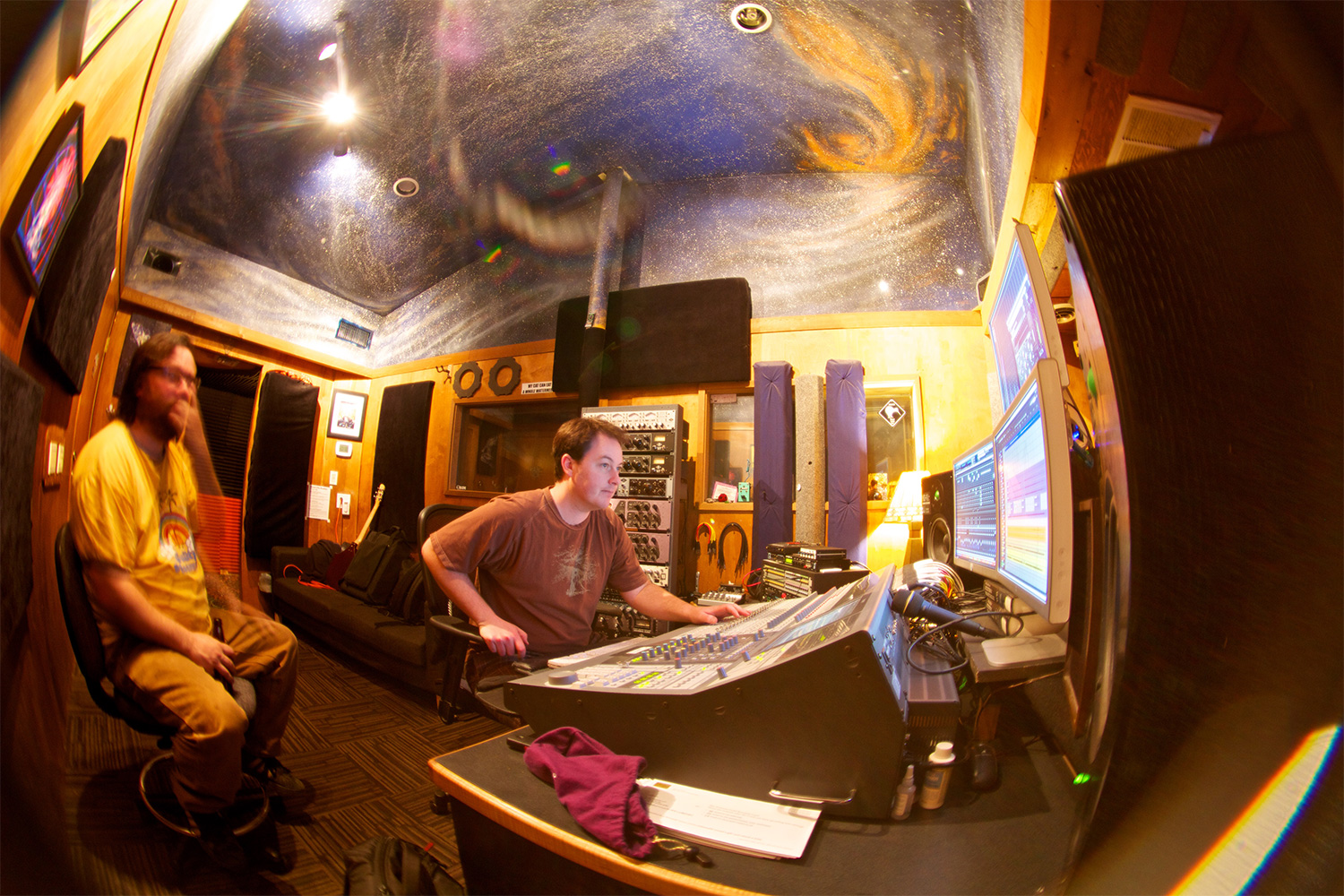
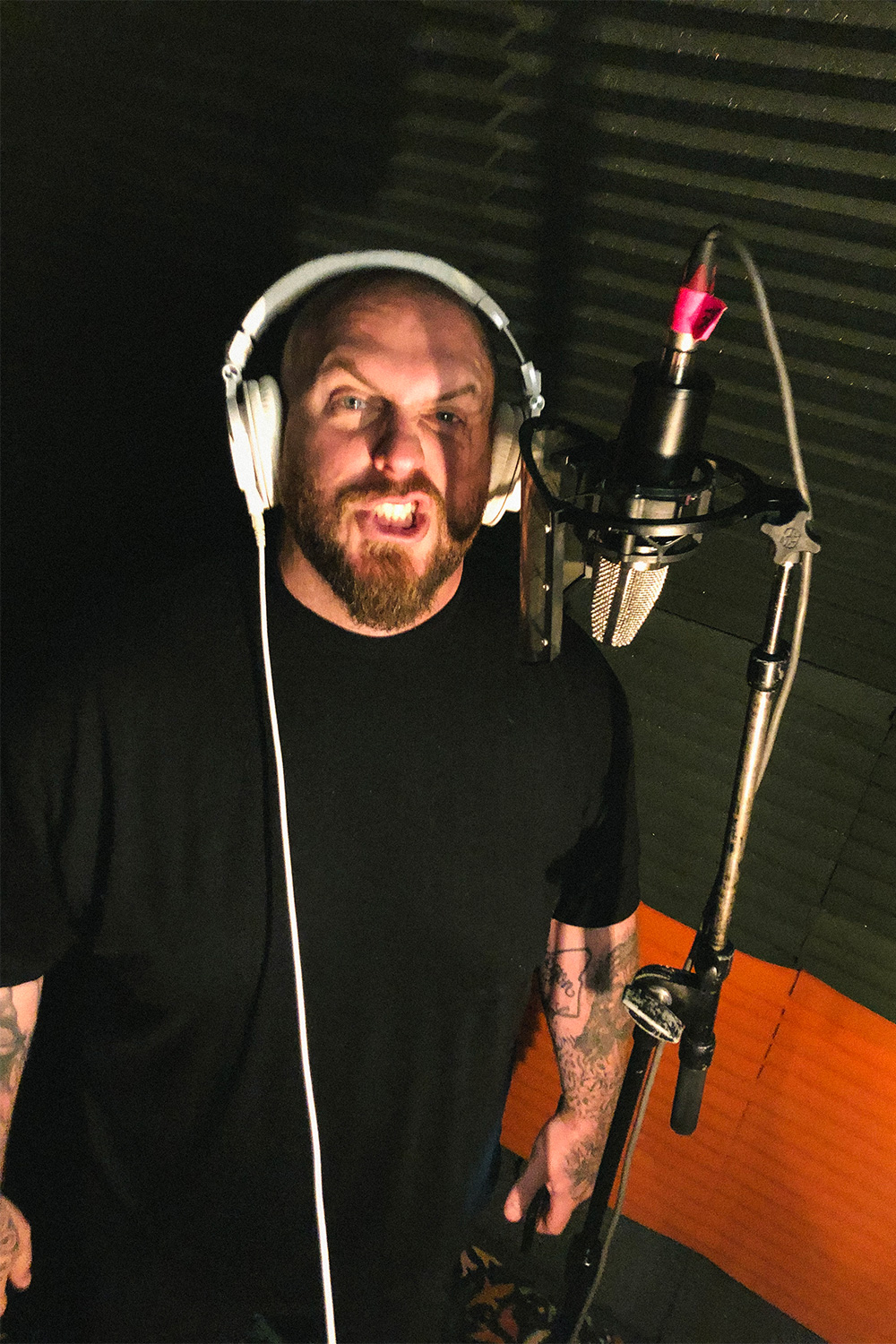
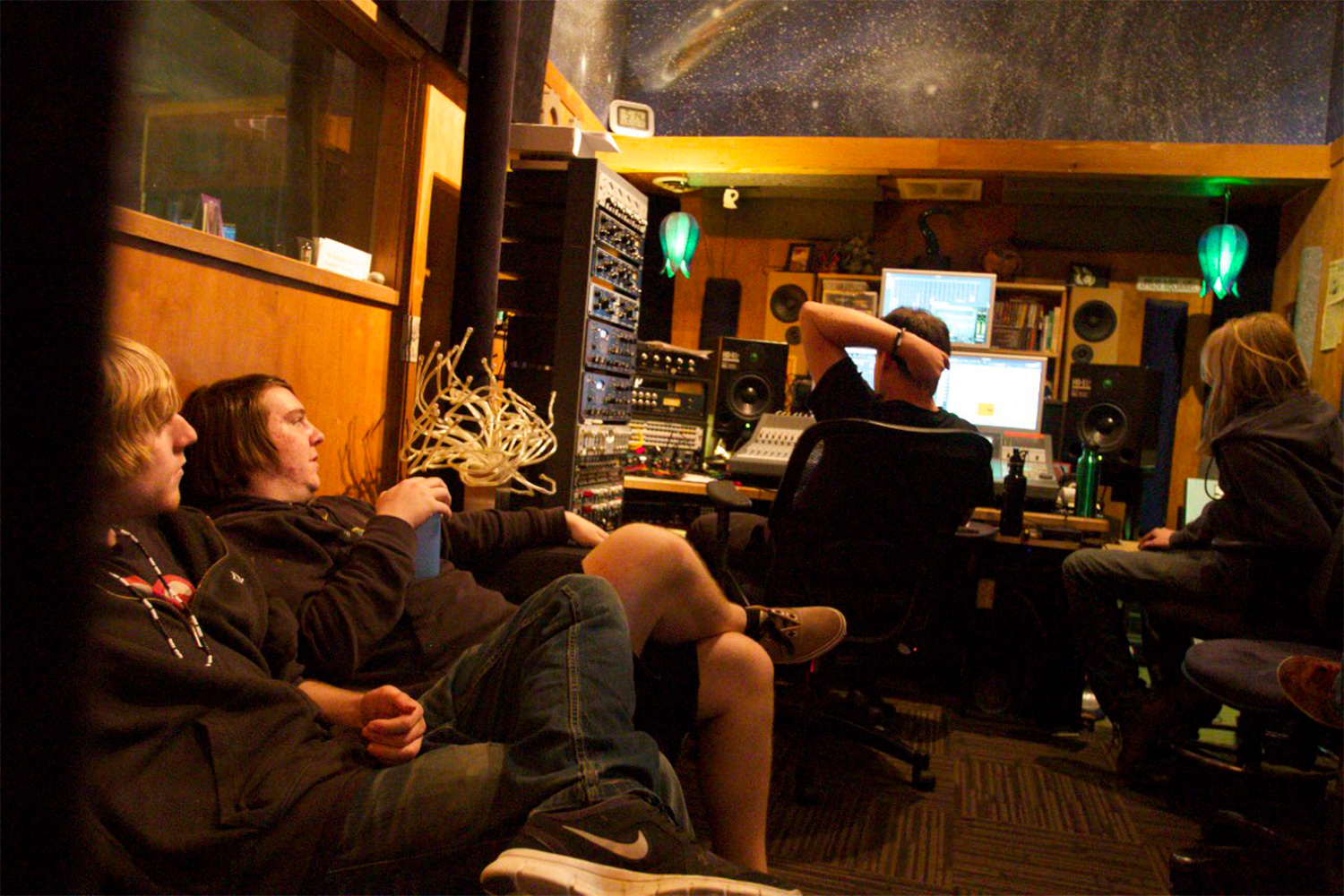
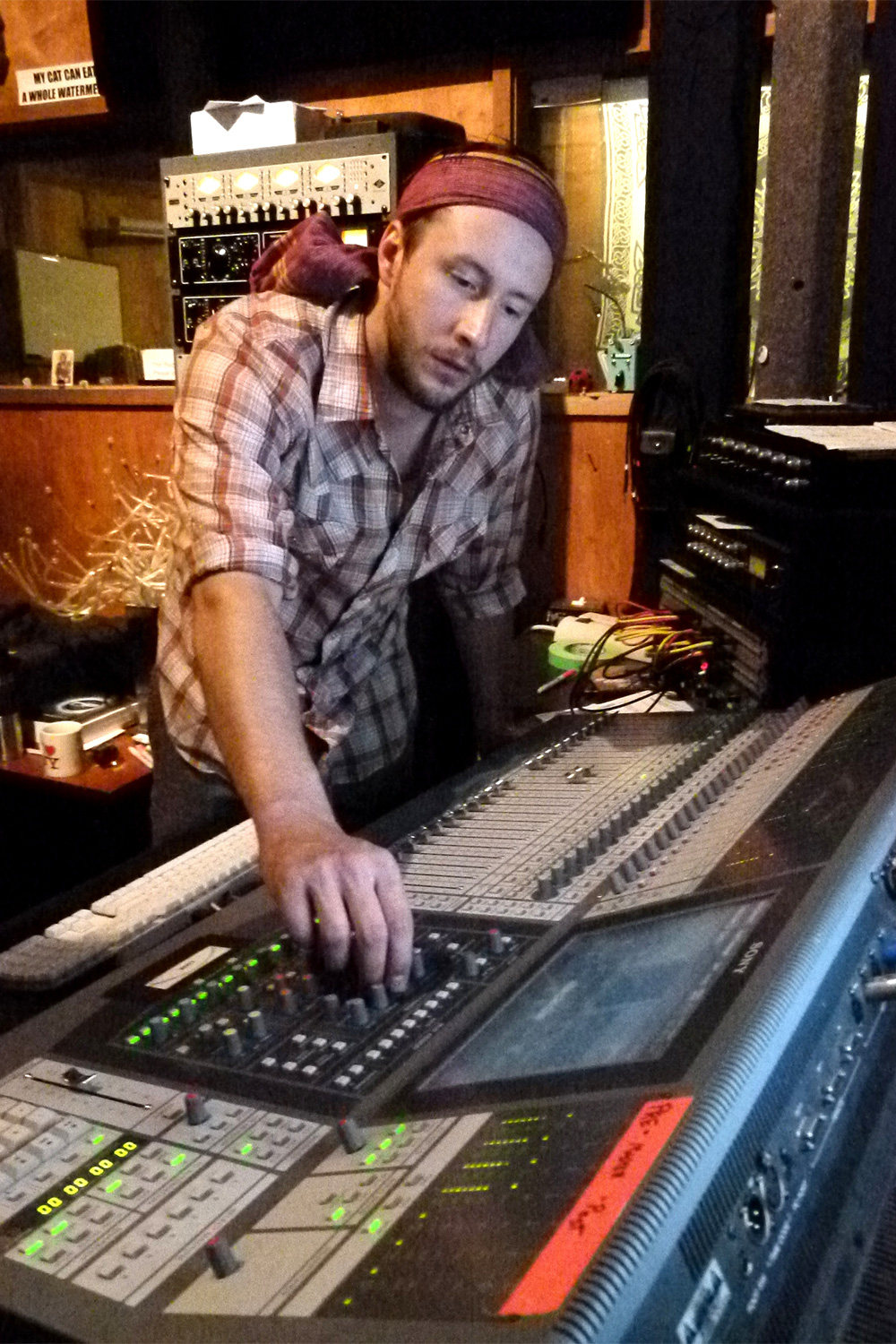
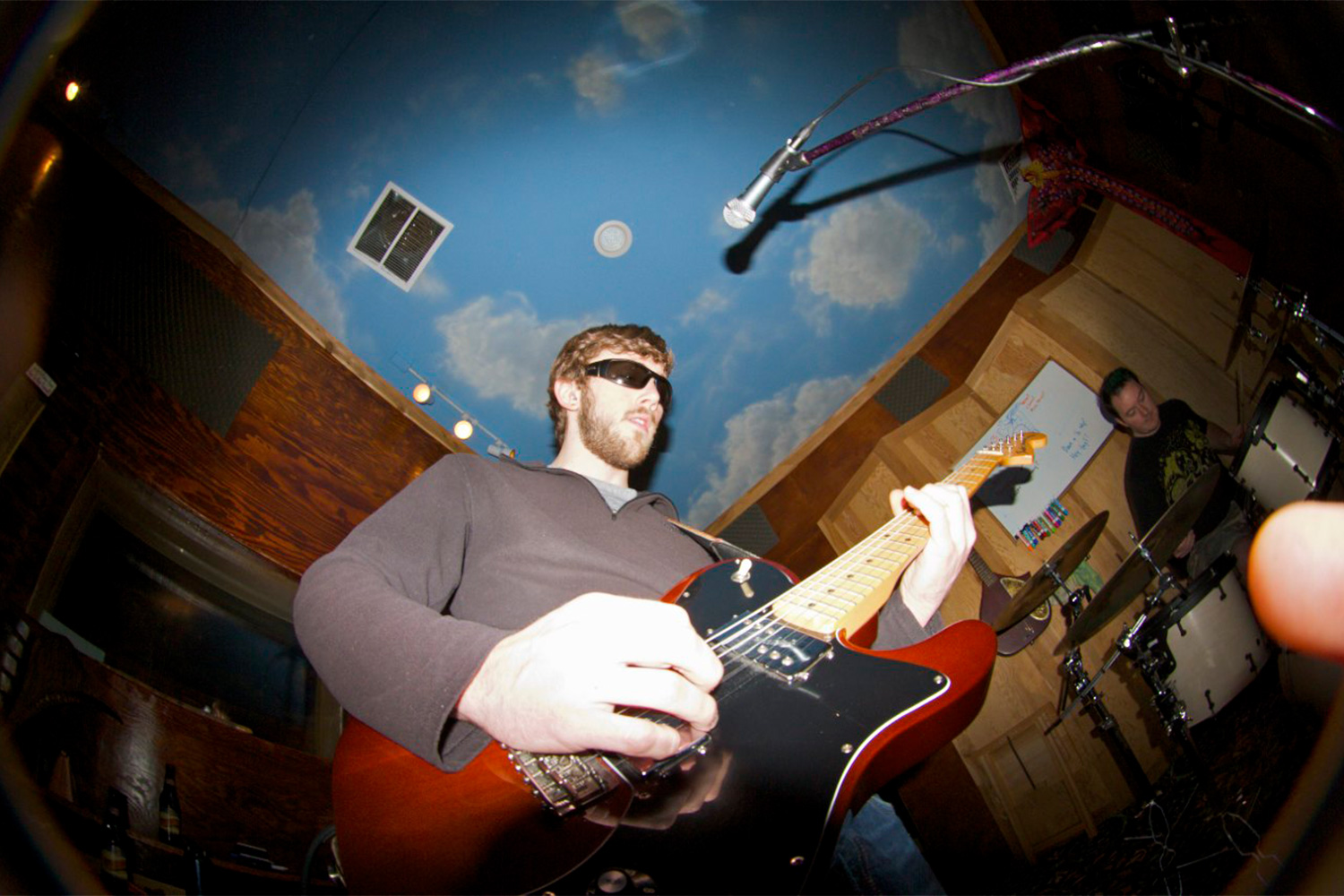
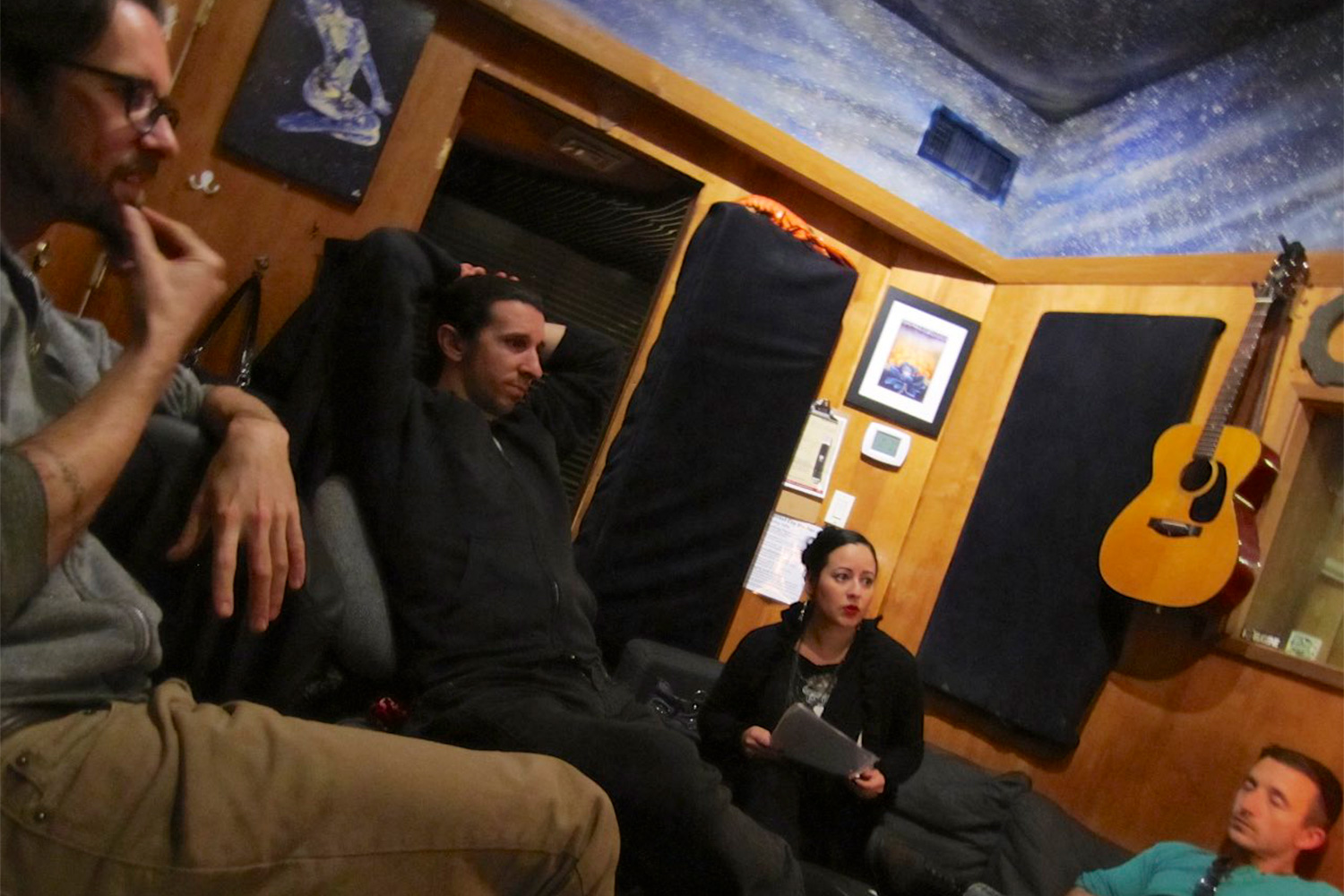
Behind the Music
When I step inside Sprout City Studios, on my right is a wall filled with stickers of the bands that have recorded at this space. I walk up a few steps and Moore is sitting in front of a computer while folk pop solo artist Clark Stacer records a track, singing in a high tenor, strumming the guitar in a waltz-like rhythm. Hanging on the wall of the control panel are two guitars: a Gibson Les Paul Jr. and an acoustic guitar with a headstock that says Sprout City on it.
After Stacer finishes the song, he steps out of the recording studio and tells me that Moore has been a teacher for him, and he’d taken his audio engineering courses that Moore offers through Liquid Mastering.
When a musician or band records at a music studio, it takes more than just plugging in and playing. Someone is there on the other side of the glass, making sure the music is being recorded properly — which includes microphone placement and ensuring musical signals are being input correctly — that then heads to a computer file.
Because Sprout City functions as a sort of a co-op, it has affordable prices that make the studio accessible for many local musicians, as well as engineers who are learning the ropes.
“It’s more sustainable because other engineers are helping me out with the bottom line here,” Moore says. “It’s not up to me to make all the money that pays all of the bills. That’s why it’s been working pretty well — even though the pandemic was hard.”
Jake Ronczyk is one of those engineers at Sprout City Studios and also works as a luthier at Guitar Center. He started as an intern in 2014 and a year later joined the roster of freelance engineers.
Working with Moore provided him an opportunity to learn music engineering in the trenches, he says. Whatever vocation you’re learning, he adds, you can only get so much out of reading a book. Working with Moore he had the opportunity to troubleshoot on the fly.
One of the more important lessons that he learned from Moore, Roncyzk says, is to work with bands. “Bands don’t know how to make decisions,” he says. “There are a lot of times where you’re trying to decide for them on the best route to go.”
Moore has had different roles recording at the studio; he’s willing to be flexible for the needs of the artist. Sometimes, he’s worked as a producer, helping with song composition and hiring session musicians, and others he just sits back and records the song.
“I have worked with so many artists,” he says. “Those with a $200 budget to those with $12,000 budget — and everything in between.”
There’s one recording session that Moore still remembers. In 2004, he was working with the local heavy metal group A Mind Like Yours. “They just had this need to have everything be over-the-top, like everything to 11,” he says. “I had to do a lot of interesting techniques to get it there.”
One issue was that the two guitarists were using two different sorts of guitars, which he says had incompatible pitches — one guitarist used a Gibson SG and the other a Schecter. Although it’s the same general instrument, manufacturing differences can alter pitches compared to other guitars. As the guitarists fingered notes high on the neck of the guitar, the two sounds would drift out of tune, he says. So the band had to play chord by chord and continuously re-tune, he adds.
“We would literally have to tune per section,” Moore says. “And it just took for-fucking-ever.”
Tuning down instruments lower than standard is common with metal bands because it has a deep, heavy sound. The bass and guitars tuned down to drop B-flat — two and a half steps from the standard tuning — and had huge, loud amps. So instead of using one microphone to record each guitarist, he had to use several, he says.
“I knew what those guys were going to want, but it took a lot out of me to get it,” Moore says. “But I figured it out and I’ve been able to carry that learning on that record with me. I’ve still got that in my back pocket in case I need it.”
It took so much time to record the guitars for the album, Moore says, but the local music scene still remembers the album. Pulling out his cell phone, Moore reads a recent text message from local musician Sam Wartenbee. “Man, I just listened to that first A Mind Like Yours record and the guitar still sounds so good!”
Away from the Numbers
The first thing that Moore is proud to show me at his mastering studio, Liquid Mastering, are the speakers. He invites me to type a song into Spotify to experience it, so after talking about Frank Black with Moore, I put on “Threshold Apprehension.”
Distorted guitar chords blast through the speakers, and it’s so clear that I can nearly hear the pick hitting the guitar strings. And when the bass and drums kick in, I almost feel like I’m at a live show again. For Moore, he says he can hear the sounds reverberating off the walls at Sprout City.
Liquid Mastering is where Moore is shifting to, planning to leave behind Sprout City, but the studio could remain a space for the local music scene. “Mastering is the last creative step in taking a work and putting it out to the world,” Moore says. “Every single album has something that has needs totally unique to it.”
Located in southwest Eugene, Moore’s Liquid Mastering Studios isn’t on the corner of two busy streets like Sprout City Studios is, rather it’s located in a quiet southwest Eugene semi-rural neighborhood. But similar to Sprout City Studios, Moore was invested into perfecting it, helping him focus on the minute intricacies of mastering.
Moore founded Liquid Mastering in 2008 while also managing Sprout City. When he first bought the property, the tall, garage-like building he works out of was a dirt floor, but from the blank canvas he built out a room, reflecting his obsession with sound.
He hired a company to lay down an isolated pad on the floor, and then he designed the room to preserve acoustics. If space has a 12x12x12 dimension, he says, sound waves end up cancelling each other out. “I was able to design this so the width, depth and the height have nothing to do with each other,” he says.
Moore worked with the local company StretchShapes, which specializes in creating fabrics for audio professionals and live events. The room also has 30 inches of material that absorbs sound behind his computer monitors and, on the side walls near the speakers, the room has different layers of acoustic walls, he says.
“It’s like I can really hear everything,” he says of the space’s acoustics.
After finishing his mastering space, it changed how he worked at Sprout City, and he decided to remodel the studio a few years ago. “Learning what I learned here,” he says of Liquid Mastering, “I was able to take that and make a better sounding control room there.”
At Liquid Mastering, Moore says his clients come from across the U.S. — from local hip-hop artist Endr Won to a church band from Boston. He’s excited to throw on a sample from a duet called Ma, a married couple who moved from Los Angeles to Montana. He puts on one of the group’s songs and a bass synth arpeggio blasts over his speakers. Ma is going to be a breakthrough artist, he tells me.
“When you’re working on mastering music, one thing that you have to do is disassociate yourself with the style of music you’re working on,” he says, “and basically work on frequency and dynamics and make sure the piece can be heard as its best on whatever playback system it’s playing on.”
Over the past few years, Moore has been moving more toward mastering, and that move has become a reality. It’s a challenge for him, he says. When engineering recordings at Sprout City, he’s found methods that work and he can get a good sound from a band or solo artist quickly. But with mastering, he’s always learning.
On Feb. 22, he posted on his personal Facebook page that he was planning on selling the studio — making his jump into mastering official.
“I’ve done a lot of digging in the dirt about where I stand, what I want, and where I’m headed, and owning a recording studio doesn’t seem part of that anymore,” he wrote. “So, it is with joy and hope I offer up the sale of my hand-crafted recording business to the next generation.”
Moore is also building an online class program on engineering that’ll be hosted on the online platform Teachable. Students will be able to learn audio engineering on it, he tells me.
The February announcement wasn’t a total surprise for Roncyzk. “This is something he’s been talking about on and off,” he says of Moore. He saw Moore slowly making the move from Sprout City to Liquid Mastering and letting the engineers take more control of the studio. But whoever Moore sells the studio to, Roncyzk says he’s sure they’ll keep the co-op model the same.
To emphasize the importance of Sprout City Studios, Roncyzk points to the wall of band stickers by the entrance. There’s only a few musicians in town who he’s met that haven’t had some involvement with the studio — whether it’s recording or having Moore make mastering touch ups.
“If Eugene could be encompassed in a place, it would be that place,” Roncyzk says.
